#Hygiene Dictatorship
Text
Does Alternative Medicine Have a Future?
by Dr.Harald Wiesendanger– Klartext
What the mainstream media is hiding
The more effective alternative medicine is, the more popular it is and the more likely it is to threaten its continued existence. Because their success endangers the profits of an overpowering opponent who can destroy them. Their humble future lies in the health economics niche where word of mouth leads – under the radar of…

View On WordPress
#Alternative Medicine#Clinic#complementary medicine#Controlled Study#Corona#Corona crisis#Digital Services Act#Disinformation#Evidence#Fact Checker#Fake News#Foundation for ways out#Fourth Power#Future of Medicine#Harald Wiesendanger#Health Care#healthcare system#Hygiene Dictatorship#Integrative Medicine#pandemic#Private Doctors#RCT#Reporting Office#Science#social media#WHO#World Health Organization
0 notes
Text
Snake Gets Done Dirtier
In The Blazing Star, Book 4 of DOTC, Snake turned against Clear Sky because he allowed One Eye into the camp against all warnings.
Clear Sky came to take his power and authority back after he massively fucked up, and Snake didn't want this. He didn't accept a bullshit apology, and attacked him.
Here is the passage again;

He turned against him because CLEAR SKY allowed a cat into the Clan that CARVED A TATTOO INTO SNAKE'S FLESH.
NOTHING, NOTHING about this interaction implies that Snake was upset that One Eye got killed. He was NOT loyal to One Eye. He did not WANT the mark. He's angry that Clear Sky "LET THIS HAPPEN" because he got a permanent brand cut into his paw.
Snake is the ONLY character who didn't accept Clear Sky's return. When he hears "We're all family here :) I risked my life to get my dictatorship back which is totally atonement :)" Snake calls it for the bullshit that it is, gets dog-piled by his sycophants, and leaves after refusing Clear Sky's "MY way or the HIGHWAY" ultimatum.
This is incredibly meaningful for the character of Snake, actually, because he was an extremely loyal minion for Clear Sky.
Described as "ugly" and "stinky" for the first books of his appearance sell him as one of the most eager, violent cats in Proto-SkyClan (interesting that the erins immediately attack appearance and hygiene to show a character is 'savage'), Snake eventually carries out Clear Sky's orders to murder cats indiscriminately at The First Battle. Everything he does for his leader is done without question. So, standing up against Clear Sky here is a REAL rejection of what Snake used to be.
Snake's RIGHT. Clear Sky DID let this happen! He's WHY this entire Clan suffered under a bigger, badder tyrant. Clear Sky ignored all the warnings he was given, and even got SO offended to hear them that he threw a fit and called his disabled brother (no, the OTHER disabled brother) a broken cat!
But the writers can't let anyone have a point that Clear Sky is a horrible leader who shouldn't be trusted with a goldfish, let alone an entire Clan. So it's time to throw that out the window and say that, ackshually, Snake was loyal to One Eye the whole time and that's why he didn't immediately bow down to Clear Sky.
In Book 6, Snake is a different character.
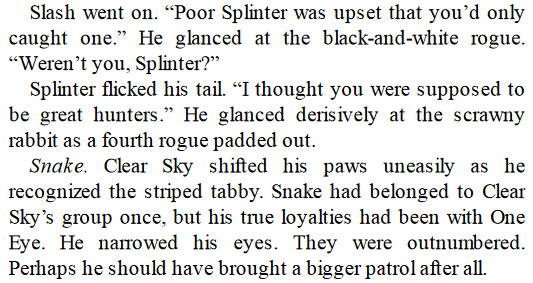
He's just evil now, serving the most evilestist character they can imagine.
Snake stood up against Clear Sky because of his BAD JUDGEMENT. He did not like One Eye. Snake was done with tyranny, and that IS a redemption moment. The start of a REAL redemption arc. Not whatever bullshit the Erins think a "redemption" arc is, where consequences are so mean because guilt is enough :(
Nope! Retcon two books later. Either intentional malice because they can't have a reasonable character STAY MAD at Clear Sky, or such utter incompetence that they can't keep the motivations of their characters consistent within their own arc.
116 notes
·
View notes
Text
Reiji - House of Chanel
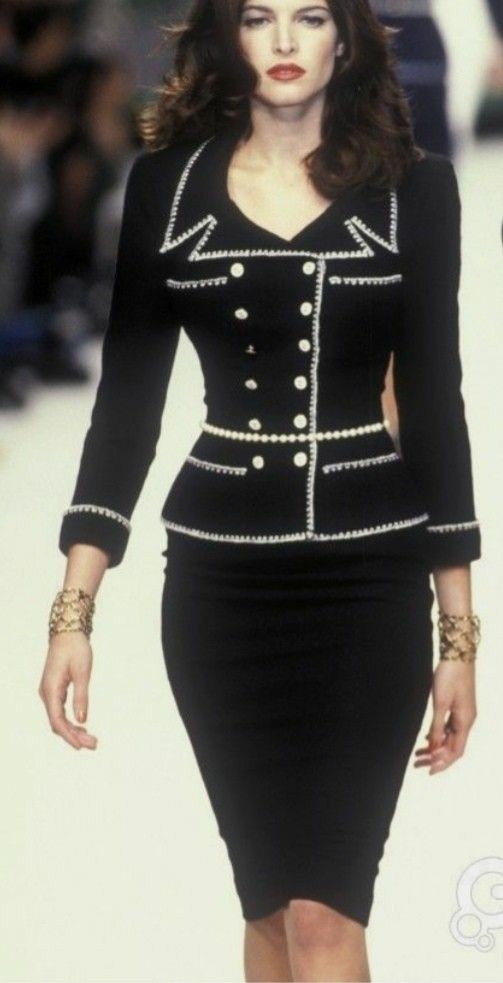

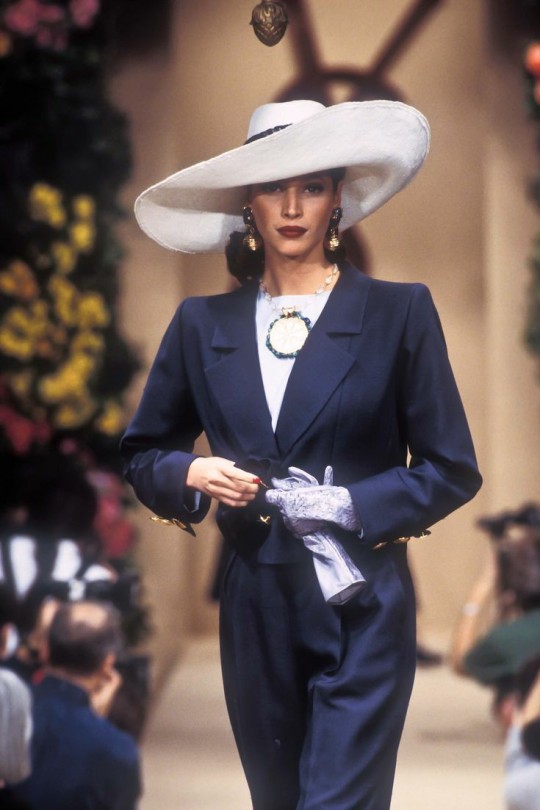
Inherently, I think this went well especially with Chanel being such a traditional fashion house but also with its very feminine undertones. In comparison to some of the others, calling Chanel Reiji’s brand was more symbolic than realistic but I’ll explain.
Chanel in all its years since 1910’s has the same iconic look, the tweed structured suits, and the armoured corset dresses with delicate but impactful embellishments. It makes sense for Reji, he has this blunt yet sophisticated personality which physically manifests in his clothes; always well put together, tailored and steamed.
His suits may change but they maintain the same composition and colour palette, to the untrained eye they don’t look different but if you look closely he pays a lot of attention to what he wears.
He’s aware even as a vampire he still has the face of an 18 year old boy, there’s still that youthfulness present in his face, he makes up for it by wearing glasses he doesn’t really need but they highlight the aristocratic cutting of his face - with his sharp upturned nose, and bright red eyes.
He doesn't have his mother’s curls or his father’s pin straight hair but rather a wavy touch to his locks, he knows how it makes him look when it’s down, younger, softer …gentle and that’s just despicable! So he carefully styles his hair with mousse slicking it back, making him look more stern.
Reiji is also a lot more sensitive ( he’s a fussy, whiny little rich brat), so he can’t stand pungent smells ( blood, guts, drugs), that doesn’t mean he makes excuses to lose his composer so he has this strong cologne that is like sandalwood and kind of fruity? Like winter berries and tea leaves or something no one expected it to smell so good but he makes it work. Not to mention his hygiene is always top tier, so he has this freshly washed cotton and minty undertone.
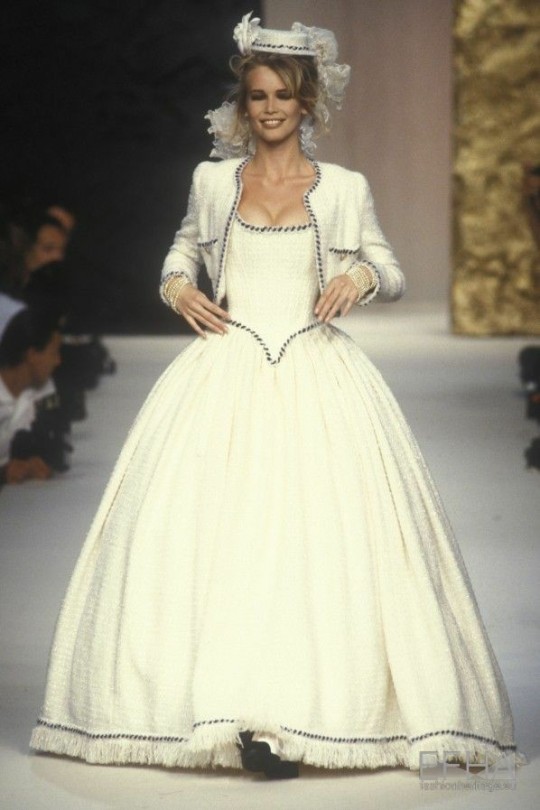


So that's his main style right? So I was in between Dior and Chanel - and Chanel won of course
Mainly I mentioned before Chanel has more feminine undertones which I think expands well with Reiji’s complex relation with his brothers; whilst the misogynistic response to his trauma is still present he almost takes on a maternal role towards his family as much of the fandom has noticed - the reasons as why he does this is quite ironic actually. In his entirety, the persona of someone being capable is important for him, if he cannot be successful in maintaining - not only his family's name and reputation through the dictatorship of his brothers - how he holds himself in public how does he expect to be King?
Yet, all the care and attention to detail he gives is almost seen as motherly. The sheer unseriousness of it is not lost on me, even with all the rampant comments on the inferiority of women within the Sakamaki Home, the most well-adjusted and competent man is seen as feminine.
In other readings of Reiji though his feminine undertones are more purposeful, they come from the fact that him and Shu are perpendicular to one another because of Shu’s immense strength being seen as this "laid back protector archetype" as intrinsically masculine so Reiji’s more mentally vulnerable, cunning, shrewd approach is seen as more feminine ;dissect that how you will. My favourite though is Reiji picking up on etiquette by copying his mother who was a figurehead for women in the vampiric society.
Also reflected in Coco Chanel who is like, not a nice woman but she did have her moments - a cause for much scandal was her pioneering for trousers and women's athletic wear believe it or not, she was a big equestrian ( is that not the most Reiji sport ever?) and encouraged women to wear equestrian kits.
I think this also goes really well with his character in terms of politics, the synonymous nature of being a traditionalist yet paving the way is a part of Reji. He very strongly believes in the House of Sakamaki and what it stands for but he also like his father wishes to further vampiric society from it’s barbarism; in some ways he is a cultural snob but in others he’s quite attentive to the the silver lining that maintains modernism and the old ways.
The House of Channel also does this; it has always had its roots cemented in the old ways of aristocratic luxury items, but unlike many other fashion houses it does try to adapt to the changing times sometimes successfully, others not so successfully.
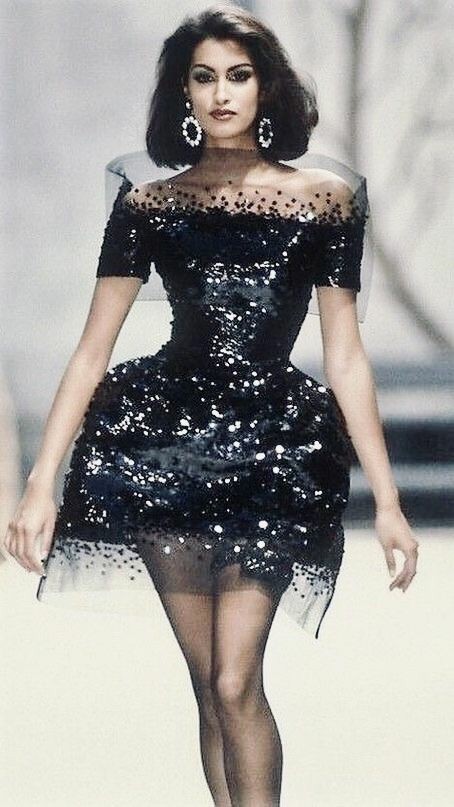

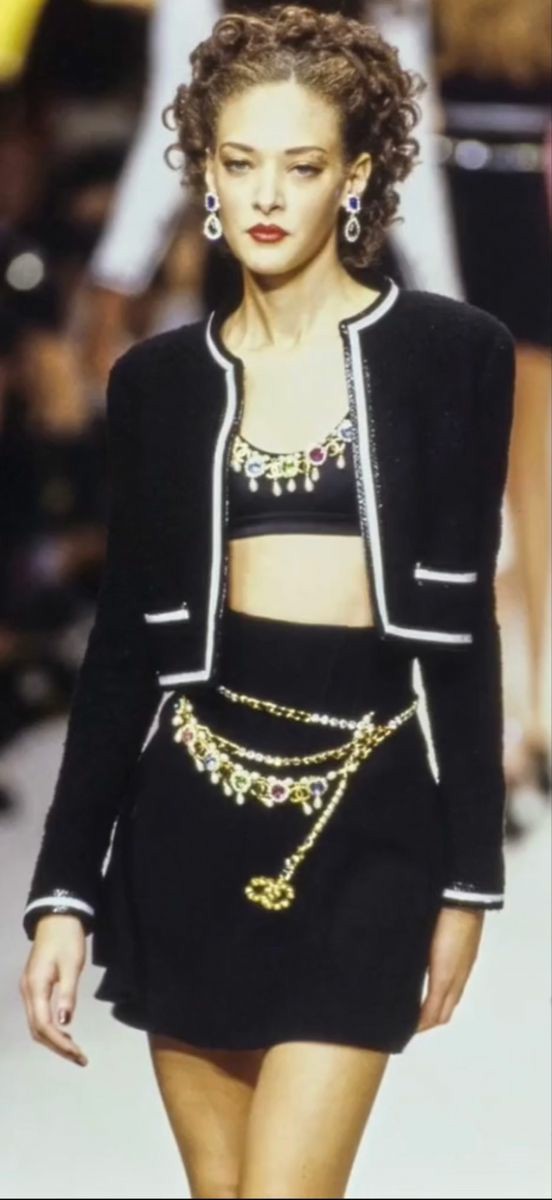

On a less serious note, in general I think it suits his aesthetic as well; as I’ve mentioned the iconic Chanel suits, but also the Corsets? Like Reiji is a big corset man I don’t care what anyone says, the timeless figure of archive Chanel pieces, the monotone colour scheme of darker colours. Moreover, even the chic pieces take inspiration from old money outfits: the arranged tulle of the Victorian era, the heavy contrast, the heavy gold pieces and brooches.
In comparison to Reiji’s fashion, with his fitted suits and tiny waist with the chain of his watch fob, as well as heavy contrast colours: blacks, reds, whites and navy’s.
Also the chunky jewellery makes sense in my head, it’s like masterfully placed so it doesn’t overwhelm him but I think the jewellery Reiji has includes: obviously the different chains for his antique watch, but also chunky rings seem more his thing than thin ones especially ones with carefully placed family jewels (rubies, emerald's, obsidians - as I said: snob) , this would do for more traditional attire too.
His outfits in the demon world definitely include brooches, and chains and pendants to embellish his outfit, eye makeup isn’t a big thing for him because it’s so fussy but he would definitely do darker eye makeup to bring out his eyes. He’s quite theatrical, and definitely plays into the ashy white vampire skin ( this is the skin of a killer Bella).
Overall, I refuse to believe he does casual clothing- like Reiji in sweats ( esp the juicy couture ones ) is a horrendous image. So yeah Reiji is a Chanel girl!
Also I can’t believe I completely forgot this but in the beginning Coco Chanel was overlooked by the media, in terms of her designs in the beginning of career because of a little brand called Polo…owned by Ralph Lauren that was also making athletic wear but also quite good friends with Coco Chanel
It’s almost like A certain someone who I said represented Ralph Lauren (Shu) overshadowing Chanel at first before she split off to make her own name.
#Spotify#dl#diabolik lovers headcanons#diabolik lovers#diaboys#diahell#yui komori#sakamaki brothers#the boys as brands#shu sakamaki#reiji sakamaki#ayato sakamaki#laito sakamaki#kanato sakamaki#dl moodboards#diabolik lovers moodboards#if anyone mentions typos i'll leave on a hiatus twice as long#or the semi colons#my life has spiraled#so like any good artist my artistic juices came back as i despair
139 notes
·
View notes
Text
"
Content warning: contains accounts of war crimes, including rape.
In the previous issue of Anarchosyndicalisme, the CNT-AIT echoed the call for solidarity from anarchists in Sudan.
Since a terrible war broke out on 15 April 2023 between two military factions – the Rapid Support Forces (or Janjaweed militias) against the official army – civilians have been living in a climate of “pure terror” because of a “ruthless and senseless conflict”, denounced by the UN with general indifference. At least 15,000 people have died, and more than 26,000 have been injured, but these figures are certainly underestimates.
There are 11 million internally displaced people, 1.8 million people in exile, and 18 million people at acute risk of starvation. 8 million workers have lost their jobs and their income. 70% of areas no longer have water or electricity, 75% of hospitals have been destroyed, 19 million students have stopped studying, 600 industrial plants have been destroyed and looted, as have 110 banks, 65% of agriculture has been destroyed, 80% of inputs (fertilisers, pesticides, agricultural machinery and harvesters) in the Geziera irrigated area – the largest in the world – have been looted and destroyed, etc.
The media and activist silence surrounding Sudan is allowing soldiers on both sides to commit genocide with impunity. The conflict between the two clans has many components: ethnic, with its trail of reciprocal genocides (according to the UN); “imperialist”, because each of the two opposing groups is supported by various foreign powers that covet Sudan for its natural resources and its strategic location. But above all, it is a “counter-revolutionary” war. By putting the country to fire and blood, it has crushed the hopes of the civil and democratic revolution. And drove many of the revolution’s activists into exile. By completely destabilising the country, this war has enabled the leaders of the former regime to remain in power without being tried for the crimes they committed over decades (during the military dictatorship and then the coup d’état).
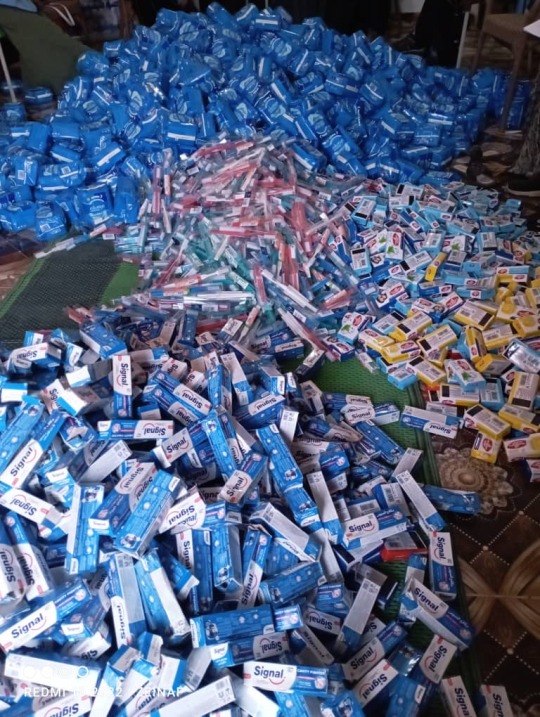
Following the appeal for solidarity, we received more than 1,200 euros (including 200 euros from the companions of the Kurdish-language anarchist forum, KAF), which we were able to pass on to our Sudanese companions. This solidarity enabled them to organise humanitarian distributions of blankets, hygiene products (sanitary pads, soap, toothpaste) and infant milk. A reception area for children was organised, with drawing materials and elementary classes, giving the children a chance to escape the madness of war.
But today, the situation is becoming impossible. The violence of the military groups is unleashed. The Janjaweed militias are behaving like barbarians towards civilians. They murdered our companion Sarah after raping her. For their part, the soldiers are arresting and torturing revolutionaries, accusing them of being allied with the Janjaweed. Our companions urgently need to seek shelter in neighbouring countries. We are relaying their desperate appeal to the international anarchist movement.
If you would like to make a contribution, please send cheques made payable to CNT AIT to CNT-AIT 7 rue St Rémésy 31000 TOULOUSE, or via PayPal: https://www.paypal.com/paypalme/cntait1 "
39 notes
·
View notes
Note
Listen, listen. That anon who made the comment on rorke’s breath…I think abt this all too often. It’s like watching game of thrones. How are these people so close to one another when you know in Medieval times they weren’t bathing every day, deodorant wasn’t a thing, and brushing teeth for sure wasn’t a thing back then so you know they be STANKIN. Same with call of duty anything, these are all big men who are in the field for DAYSSSS I already know they don’t have regular access to hygiene products or the ability to even try in the first place…I love the stank men tho 🫶 (rip Logan’s nostrils tho)
EXACTLY LOL like you know damn well Rorke’s Donkey Kong built ass doesn’t have everyday access to showers/toothbrushing/deodorant/etc, while running a dictatorship in the middle of SOUTH AMERICA…😭 do I still unfortunately love that man bad? Yea. But do I know he stank? Yea😟
#imagine#stank ass 😻#call of duty ghosts#gabriel rorke#call of duty rorke#cod ghosts#gunnrblze rambles
18 notes
·
View notes
Text

@yuukanaazu hi there! thank u for your question, i would LOVE to talk about this. i've thought about this so much and i love the who Mukami backstory. i would like to disclaim i'm not a history expert but i've researched this a fuck ton. whilst a lot of the Mukami routes have bits of the Romanian history lore scattered around, the most lore comes from Ruki's MB but especially his LE, so i'm going to be using that as my main source.
putting this under a cut here because it's very long. TW for discussions of the Romanian orphan crisis.
so right off the bat in MB, we see Ruki clearly has this trauma surrounding something which happened in an eastern european nation, as seen in this manga panel when he's sitting in class and the teacher is talking about an outbreak of orphans.
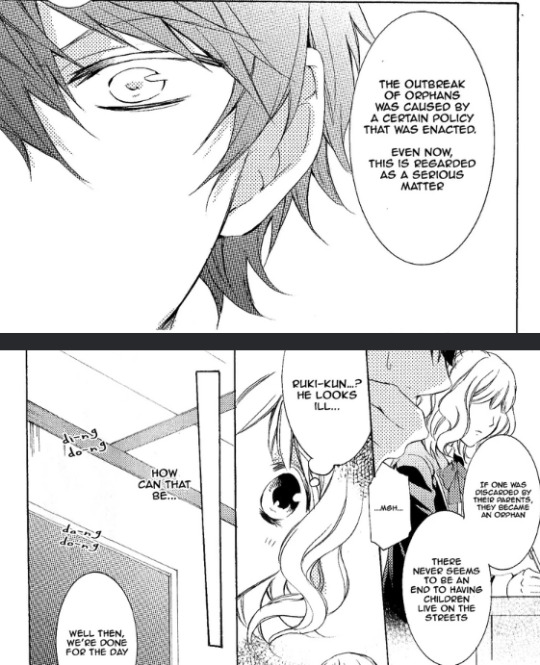
although they don't SAY Romania, it's pretty heavily implied that it's Romania as this was where the infamous orphan crisis occurred and we know the Mukami's met in an orphanage. the REAL confirmation of what actually happened in Romania comes from Ruki's LE.
credit where credit is due, rejet did alright with the Romania lore. in the 1960s, Romania was under a dictatorship by Ceaușescu. Ceaușescu's socialist policies had Romania and its capital Bucharest in declining conditions. wild-spread poverty caused children to run away from home so there were already some children on the streets. Decree 770 was enacted in 1966 which banned abortion and contraception with the hope of population growth directly leading to economic growth.
Ruki's father was supposedly a politician during the time of Decree 770 being enacted. it is implied Karlheinz convinced Ceaușescu to impose Decree 770 to cause wide-spread casualties particularly in children and use these for ghoul experiments. Karlheinz also convinced Ceaușescu to impose higher taxes and embezzle public funds.
it's unclear exactly when Ruki's father was dismissed from his political position, but we see it happen in LE and he becomes an alcoholic. over the next few years, birth rates would increase substantially, especially over 1967, 1968 and 1969 when the policy was still knew. parents who were unable to take care of their children gave them up to orphanages. by 1977, parents were taxed for being childless. potentially this is when Ruki's father dies and they all enter the orphanage.
children ran away from home due to parents being overloaded with children and poverty stricken. by the 1980s, conditions in the orphanages had significantly declined. Ceaușescu was killed in December 1989. supposedly, Kalrheinz was assassinated at the end of the revolution too, and was hung in public, but his corpse disappeared.
conditions in the orphanages were as follows:
Children did not have access to food, water, medicine or basic needs
Many were not educated and were illiterate
Hygiene was below standard and sexual assault common
HIV/AIDS spread throughout orphanages particularly in the 1980s
Military run orphanages often saw violent child abuse��
Children self-harmed and abused aurolac, a type of paint inhaled as a solvent (commonly distributed around Bucharest during this period right through to common times)
Gangs were formed inside and outside the orphanages which led to further violence
There weren't enough beds
Some children were sold off as slaves for money or to be abused (Kou is an example of this)
Disabled children were sent to special places and were treated the worst
the Mukami's lore is mostly implied from theories, and the bullet points i'm about to drop are only my perspective. though it is based off canon events.
here, we are going to assume the timeline matchup or make some kind of sense…
it DOES kind of make sense if you imagine the Mukami's to be born in 1966/67 due to the abortion ban
thus they would be around age 10-11 in 1977 when they all entered the orphanages
obviously the orphanages were overcrowded by this point in time, hence the conditions were so bad
Azusa was at the orphanage first and when Ruki arrived, he followed him around
Ruki was creeped out at first but eventually came to see Azusa as a younger brother
then Ruki meets Kou when he's in the middle of trying to kill himself and calls him a loser
Yuma joined the orphanage last, and became friends with everyone after meeting Kou in the punishment cell
so the order is Azusa, then Ruki, then Kou, and then Yuma
Ruki
Ruki's father was a politician… until he wasn't
when Decree 770 was enacted, he turned into an alcoholic and began abusing Ruki's mother
it's explained in Ruki's LE Maniac Epilogue and it's a bit vague but I do think the implication is that Ceaușescu imposing higher taxes (potentially the childless tax in 1977) is what caused Ruki's father's dismissal
this means Ruki was a baby when Decree 770 was first enacted but he was pampered so he didn't know that was going on in the real world
1977, Ruki's father was fired then committed suicide, his mother had an affair and ran off, and Ruki entered the orphanage
he was beaten up a lot for being an ex-aristocrat
Kou
Kou was born to an aristocratic family but they were exiled when he was still young
(i headcanon his parents being from another country, possibly Italy considering his name was Emilio)
he was off-handed to a nanny but she abandoned him when he was young
she potentially abandoned him due to having to care for too many orphans (early 1970s)
kou spent most his childhood on the streets, at which point he was shown to beg for food and money
he exchanged this (IN CANON!!) for aurolac (which i write about here)
eventually he was taken into the orphanage, right when some army officers shot some people in front of him
there he was sold off to aristocrats, aka slavery, and gouged out his eye
continued using aurolac in the orphanage
Yuma
i will assume he ended up in Bucharest around mid-1970s
his farming family in the village which burnt down was poor due to socialist policies and higher taxes
he was in a gang as the name Bear and was one day thrown into the orphanage when everyone else was shot
his leader Lucks had been shown to be prostituting himself to get money for the gang
Yuma steals food from the orphanage and got into a lot of fights due to people insulting his gang
Azusa
Azusa was raised by Romani people
it isn't clear whether he was born into a Romani family or whether he was born accidentally and abandoned and then taken in by the Romani people
i personally headcanons the former
he was weak compared to everyone and Justin, Melissa and Christina beat him up a lot
one day they were killed for burglary and Azusa cried
then he passed out in front of a shop and was sent to the orphanage
he enjoys getting beaten up at the orphanage and that's when he meets Ruki
i am sorry that this is SO LONG. if you made it to the end, thank u and congratulations. i love this lore. if you want it saved somewhere, i have it all here (+ more information).
56 notes
·
View notes
Text
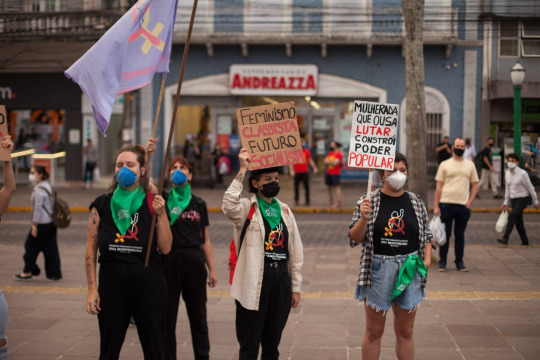
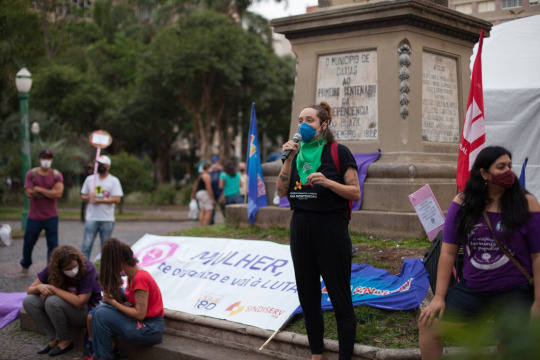
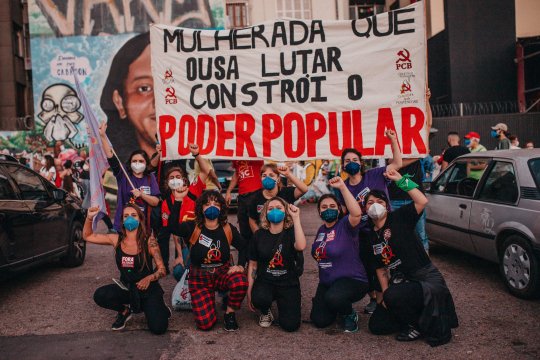
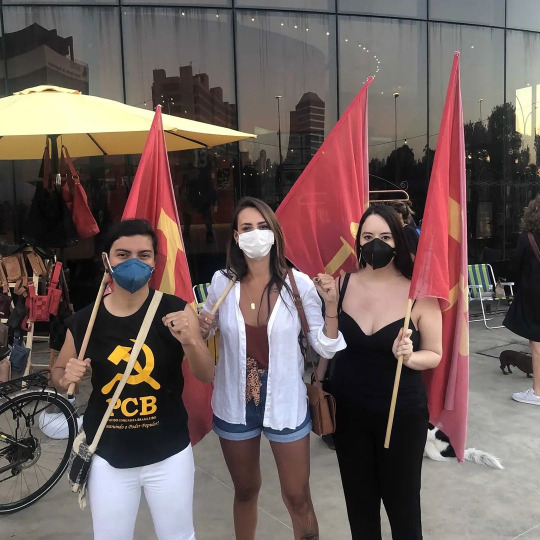
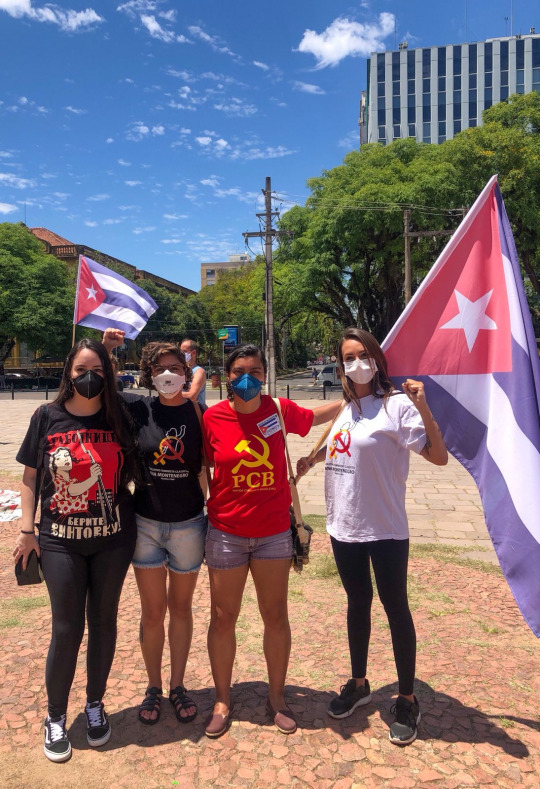
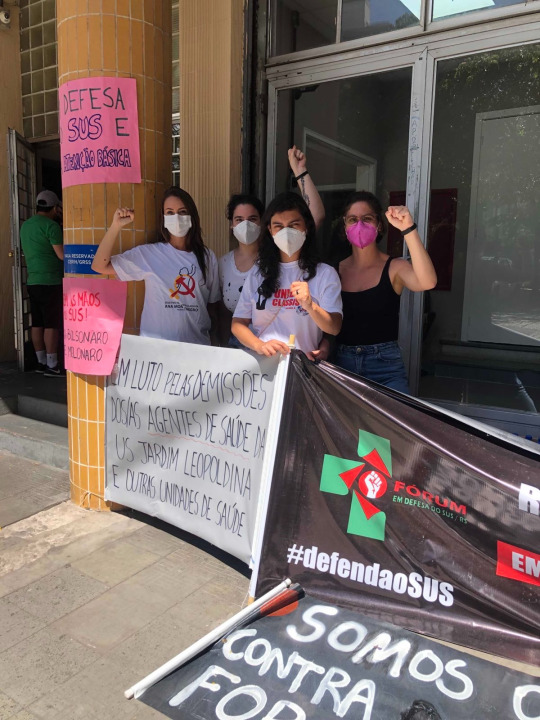
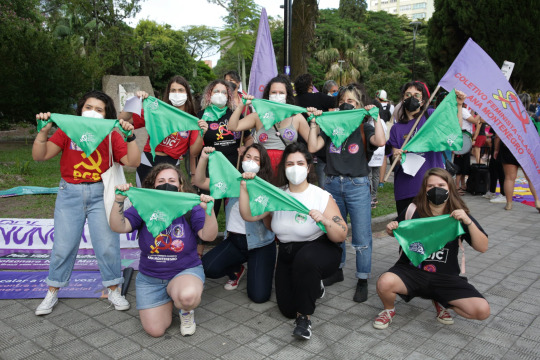
Protests lead by the Feminist Classist Collective Ana Montenegro
CFCAM is a national collective linked to the Brazilian Communist Party (PCB) that operates in several regions of Brazil. ☭ classist feminism, socialist future! ☭
Coletivo Feminista Classista Ana Montenegro was inspired by the unique history of Brazilian Communist Party women. During the Junta military dictatorship, women revolutionaries were singled out and held separately. Misogynists believed that women were less committed to the cause and could be domesticated. The gendered nature of the oppression in which women militants had to combat constant sexual harassment from the guards, as well as fight for specifically feminine needs such as hygiene and menstrual products birthed a new Marxism-Feminism. Combining the Leninist principles of Party organization with the particular gendered needs of women. This was a classist feminism recognizing that the sexual oppression of political prisoners was based on proletarian women's threat to the capitalist state. In a country long plagued by a patriarchal machismo culture, it is so uplifting to see empowered women taking the lead in Revolution.
16 notes
·
View notes
Text
today 24/3 is a very important day in Argentina "Día de la Memoria por la Verdad y la Justicia" where we commemorate the victims of the civic-military dictatorship. More than 30 thousand people were tortured, raped and killed in hands of the military. Mothers birthed they children in smalls rooms, with cold, none hygiene and in a lot of pain and then had their babies taken away. They never came back, they made them disappear and that's why we don't forget.
Because the memory is what a country needs to grow and it is what it needs to never made those mistakes ever again.
Nunca más.
6 notes
·
View notes
Text
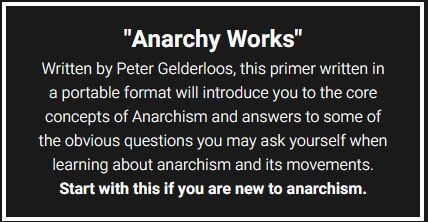
Chapter 3. Economy
Don’t people need bosses and experts?
How can anarchists organize themselves in the workplace and coordinate production and distribution across an entire economy without bosses and managers? In fact, a great deal of resources are lost through competition and middlemen. Ultimately it is the workers who carry out all the production and distribution, and they know how to coordinate their own work in the absence of bosses.
In and around Turin, Italy, 500,000 workers participated in a factory takeover movement after World War I. Communists, anarchists, and other workers who were pissed off at their exploitation launched wildcat strikes, many of them eventually gaining control of their factories and setting up Factory Councils to coordinate their activities. They were able to run the factories themselves, without bosses. Eventually, the Councils were legalized and legislated out of existence — in part co-opted and absorbed into the labor unions, whose institutional existence was threatened by autonomous workers’ power no less than the owners were.
In December 2001, a long-brewing economic crisis in Argentina matured into a run on the banks which precipitated a major popular rebellion. Argentina had been the poster child of neoliberal institutions such as the International Monetary Fund, but the policies that enriched foreign investors and gave middle class Argentinians a First World lifestyle created an acute poverty for much of the country. Anti-capitalist resistance was already widely developed among the unemployed, and after the middle class lost all its savings, millions of people took to the streets, rejecting all the false solutions and excuses offered by politicians, economists, and the media, declaring instead: “Que se vayan todos! ” They all must go! Dozens were killed by police, but people fought back, shaking off the terror left over from the military dictatorship that ruled Argentina in the ’70s and ’80s.
Hundreds of factories abandoned by their owners were occupied by workers, who resumed production so they could continue to feed their families. The more radical of these worker-occupied factories equalized wages and shared managerial duties among all workers. They made decisions in open meetings, and some workers taught themselves tasks such as accounting. To ensure that a new managerial class did not arise, some factories rotated managerial tasks, or required that people in managerial roles still work on the factory floor and perform the accounting, marketing, and other tasks after hours. As of this writing, several of these occupied workplaces have been able to expand their workforce and hire additional workers from Argentina’s huge unemployed population. In some cases, occupied factories trade needed supplies and products with one another, creating a shadow economy in a spirit of solidarity.
One of the most famous, the Zanon ceramics factory located in southern Argentina, was shut down by the owner in 2001 and occupied by its workers the following January. They began running the factory with an open assembly and commissions made up of workers to manage Sales, Administration, Planning, Security, Hygiene and Sanitation, Purchasing, Production, Diffusion, and Press. Following the occupation, they rehired workers who had been fired before the closing. As of 2004, they numbered 270 workers and produced at 50% of the production rate before the factory was closed. Bringing doctors and psychologists on site, they provided themselves with healthcare. The workers found that they could pay their workforce with just two days of production, so they lowered prices 60% and organized a network of young vendors, many previously unemployed, to market the ceramic tiles throughout the city. In addition to producing tiles, the Zanon factory involves itself with social movements, donating money to hospitals and schools, selling tiles at cost to poor people, hosting films, performances, and art shows, and carrying out solidarity actions with other struggles. They also support the Mapuche struggle for autonomy; and when their clay supplier stopped doing business with them for political reasons, the Mapuche began supplying clay. As of April 2003, the factory had faced four attempted evictions by the police, with the support of the trade unions. All were forcefully resisted by the workers, assisted by neighbors, piqueteros, and others.
In July 2001, the workers of the El Tigre supermarket in Rosario, Argentina, occupied their workplace. The owner had shut it down two months earlier and declared bankruptcy, still owing his employees months in wages. After fruitless protesting, the workers opened El Tigre and began running it themselves through an assembly that allowed all workers a part in decision-making. In a spirit of solidarity they lowered prices and began selling fruit and vegetables from a local farmers’ cooperative and products made in other occupied factories. They also used part of their space to open a cultural center for the neighborhood, housing political talks, student groups, theater and yoga workshops, puppet shows, a café, and a library. In 2003, El Tigre’s cultural center held the national meeting of reclaimed businesses, attended by 1,500 people. Maria, one collective member, said of her experience: “Three years ago, if someone had told me we’d be able to run this place I’d never have believed them... I believed we needed bosses to tell us what to do, now I realize that together we can do it better than them.” [32]
In Euskal Herria, the Basque country occupied by the states of Spain and France, a large complex of cooperative, worker-owned businesses has arisen, centered around the small city of Mondragón. Starting with 23 workers in one cooperative in 1956, the Mondragón cooperatives included 19,500 workers in over 100 cooperatives by 1986, surviving despite the heavy recession in Spain at the time and with a survival rate many times better than the average for capitalist firms.
Mondragón has had a rich experience over many years in manufacturing products as varied as furniture, kitchen equipment, machine tools, and electronic components and in printing, shipbuilding, and metal smelting. Mondragón has created hybrid cooperatives composed of both consumers and workers and of farmers and workers. The complex has developed its own social security cooperative and a cooperative bank that is growing more rapidly than any other bank in the Basque provinces. [33]
The highest authority in the Mondragón cooperatives is the general assembly, with each worker-member getting one vote; the specific management of the cooperative is carried out by an elected governing council, which is advised by a management council and a social council.
There are also many criticisms of the Mondragón complex. To anarchists it comes as no surprise that a democratic structure can house an elite group, and according to Mondragón’s critics this is exactly what has happened as the cooperative complex seeks — and achieves — success within a capitalist economy. Although their accomplishment is impressive and gives lie to the assumption that large industries must be organized hierarchically, the compulsion to be profitable and competitive has pushed the cooperatives to manage their own exploitation. For example, after decades of sticking by their egalitarian founding principles regarding pay scales, eventually the Mondragón cooperatives decided to increase the salaries of the managerial and technical experts relative to the manual workers. Their reason was that they had a hard time retaining people who could receive much higher pay for their skills in a corporation. This problem indicates a need to mix manual and intellectual tasks to avoid the professionalization of expertise (i.e. creating expertise as a quality restricted to an elite few); and to build an economy in which people are producing not for profit but for other members of the network, so money loses its importance and people work out of a sense of community and solidarity.
People in today’s high-tech societies are trained to believe that examples from the past or from the “under-developed” world have no value for our situation today. Many people who consider themselves educated sociologists and economists dismiss the Mondragón example by classifying Basque culture as exceptional. But there are other examples of the efficacy of egalitarian workplaces, even in the heart of capitalism.
Gore Associates, based in Delaware, is the billion dollar high-tech firm that produces waterproof Gore-Tex fabric, special insulation for computer cables, and parts for the medical, automobile, and semiconductor industries. Salaries are determined collectively, no one has titles, there is no formal management structure, and differentiation between employees is minimized. By all capitalist standards of performance — employee turnover, profitability, product reputation, lists of best companies to work for — Gore is a success.
An important factor in their success is adherence to what some academics call the Rule of 150. Based on the observation that hunter-gatherer groups around the world — as well as successful communities and intentional communes — seem to keep their size between 100 and 150 people, the theory is that the human brain is best equipped to navigate webs of personal relationships of up to 150. Maintaining intimate relationships, remembering names and social status and established codes of conduct and communication — all this takes up mental space; just as other primates tend to live in groups up to a certain size, human beings are probably best suited to keep up with a certain number of companions. All Gore factories keep their size below 150 employees, so each plant can be entirely self-managing, not just on the factory floor but also including the people responsible for marketing, research, and other tasks.[34]
Skeptics often dismiss the anarchistic example of small-scale “primitive” societies by arguing that it’s no longer possible to organize on such a small scale, given the huge population. But there is nothing to stop a large society for organizing itself in many smaller units. Small-scale organization is eminently possible. Even within a high-tech industry, Gore factories can coordinate with one another and with suppliers and consumers while maintaining their small scale organizational structure. Just as each unit is capable of organizing its internal relations, each is capable of organizing its external relations.
Of course, the example of a factory producing successfully within the capitalist system leaves much to be desired. Most anarchists would sooner see all factories burned to the ground than anti-authoritarian forms of organization used to sugarcoat capitalism. But this example should at least demonstrate that even within a large and complex society, self-organization works.
The example of Gore is still problematic because the workers do not own the factory, and also because formal management could be reimposed at any time by the company owners. Anarchists theorize that the problems of capitalism do not exist only in the relationship between workers and owners, but also between workers and managers, and that as long as the manager-worker relationship persists, capitalism can reemerge. This theory is certainly born out by the Mondragón example, where over time managers gained more pay and power and renewed the unequal, profit-focused dynamics typical of capitalism. Taking this into account, several anarchists have designed an outline for a “participatory economy,” or parecon, though no one has yet had the opportunity to set up such an economy on any considerable scale. Among other things, parecon emphasizes the importance of empowering all workers by mixing tasks that are creative and rote, mental and manual, thus creating “balanced job complexes” that will prevent the emergence of a managerial class.[35]
During the rebellion in Oaxaca in 2006, people without prior experience organized themselves to run occupied radio and television stations. They were motivated by the social need for free means of communication. The March of Pots and Pans, the legendary women’s march on August 1, 2006, culminated with thousands of women spontaneously taking over the state-run television station. Inspired by the sudden sense of power they had won by rebelling against a traditionally patriarchal society, they took over Channel 9, which continuously slandered the social movements while claiming to be the channel of the people. At first, they made the engineers help them run the station, but soon they were learning how to do it themselves. One woman recounted:
I went daily to the channel to stand guard and help out. The women were organized into different commissions: food, hygiene, production, and security. One thing I liked is that there were no individual leaders. For each task there was a group of several women in charge. We learned everything from the beginning. I remember somebody asking who could use a computer. Then many of the younger girls stepped forward, saying, “me, me, I can!” In Radio Universidad, they announced that we needed people with technical skills, and more people came to help. In the beginning, they were filming headless people, you know. But the experience at Channel 9 showed us that where there’s a will, there’s a way. Things got done, and they got done well.
In the short time [three weeks] that Channel 9 was running, until Governor Ulises commanded that the antennas be destroyed, we managed to spread a lot of information. Movies and documentaries were shown that you could never have imagined seeing on TV otherwise. About different social movements, about the student massacre in Tlatelolco in Mexico City in 1968, the massacres in Aguas Blancas in Guerrero and Acteal in Chiapas, about guerrilla movements in Cuba and El Salvador. At this time, Channel 9 wasn’t just the women’s channel anymore. It was the channel of all the people. The ones participating made their own programs as well. There was a youth program and a program where people from the indigenous communities participated. There was a program of denouncements, where anyone could come and denounce how the government had treated them. A lot of people from the different neighborhoods and communities wanted to participate, there was hardly enough airtime for all of them.[36]
After the occupied television station was taken off the air, the movement responded by occupying all eleven commercial radio stations in Oaxaca. The homogeneity of commercial radio was replaced by myriad voices — a radio station for university students, one for the women’s groups, one radio station occupied by the anarchists from a punk squat — and there were more indigenous voices on the radio than ever before. Within a short time, people in the movement decided to return most of the radio stations to their self-styled owners, but kept control of two of them. Their goal was not to suppress the voices that opposed them, as artificial as commercial voices are, but to win themselves the means to communicate. The remaining radio stations operated successfully for months, until government repression shut them down. One university student involved in taking over, running, and defending the radio stations said:
After the takeover, I read an article that said that the intellectual and material authors of the takeovers of the radios weren’t Oaxacan, that they came from somewhere else, and that they received very specialized support. It said that it would have been impossible for anyone without previous training to operate the radios in such a short amount of time, because the equipment is too sophisticated for just anyone to use. They were wrong.[37]
#anarchism#daily posts#communism#anti capitalist#anti capitalism#late stage capitalism#anarchy#anarchists#libraries#leftism#anarchy works
4 notes
·
View notes
Text
dispatch from your local anarchist: i saw a report from the arms control association about rising tensions between north and south korea and wanted to write something out in case it hadn't made the tumblr news. when i searched up "north korea" to see if anyone had talked about it, i came up with several posts that seemed like overt support for the country's literal authoritarian dictatorship (screenshot of the post that initiated this response under "read more"). with that in mind, here are some sources. please, stop romanticizing countries that make their own people suffer. this should not need to be said.
to start, learn about the north korean famine in the 1990s. here are some quotes to give you quick facts. "In 1995, the regime "triaged" the entire northeast region of the country—in essence, blocking food shipments to that portion of the population in order to ensure subsistence food supplies for the capital Pyongyang, whose support was critical to the government." "He said that recorded death rates in towns, cities, and regions whose records were accessible show that somewhere between 10 and 19 percent of their populations perished in the famine. Tellingly, only 55 percent of people voted in North Korea's 1998 national elections—in a country in which not voting is a crime." and there were new reports of starvation in 2023, by the way.
ready for your next fact? "In the early 1990s, trade figures leaked to the media revealed that Kim was the largest single consumer of Hennessy cognac, importing more than $650,000 worth of top-of-the-line stock a year for his private collection." please also note when the aforementioned famine took place.
"Kim Jong Il's annual cognac expense was about 500 times the average North Korean's annual income." unsurprisingly, did you know that on a global index of corruption, north korea is tied for 171st, 6th from being the worst?
"Rare footage obtained by BBC Korean shows North Korea publicly sentencing two teenage boys to 12 years of hard labour for watching K-dramas." yes, you did read that right. 12 YEARS.
"In the North, not only is listening to foreign radio or television broadcasts a severely-punished crime, it is illegal even to own or possess a radio or television set capable of being tuned to any station other than the official North Korean media." reporters without borders lists it last in the world press freedom index.
an article from human rights watch on labor camps: "The report, by the UN Office of the High Commissioner for Human Rights, found that North Korea currently engages in torture, wrongful imprisonment, and forced hard labor under exceptionally harsh conditions against anyone held in its short-term detention facilities system and its long-term hard labor prison camps for ordinary crimes, or kyohwaso – widespread and systematic abuses that could amount to crimes against humanity. The UN report documents starvation, severe beatings, the prolonged use of stress positions, and psychological abuse. It also details the denial of medical care, sanitation, and hygiene products, all of which make for severe mental and physical suffering." i don't need to explain why this is awful.
just a few quotes from amnesty international's report. "More than 40% of the population were undernourished and required humanitarian assistance." "Some children were forced by the state to work in coal mines and on farms under dangerous conditions. In addition to their education, children were required to perform state-imposed tasks such as cleaning, farming and working in construction." "Open criticism of the authorities or leadership was not allowed. Extreme anxiety and fear was pervasive among people who were at risk of being detained for political reasons and charged with anti-party or anti-state crimes." "Arrests were made on the grounds of violations of quarantine rules such as smuggling, isolation and cross-border travel attempts, as well as drug use, engagement in religious practices (no alternative belief systems are tolerated by the authorities) and accessing foreign information."
just stop it, please.

this is the one that really got to me. re: "we are barred from witnessing that with our own eyes," media restriction comes from north korea itself, in case you forgot. and while the u.s. and other countries have mountains of issues, a number of which are listed, please note that op has no sources listed to refute the human rights abuses in north korea. the link about western propaganda went to instagram, so even though the page didn't load for me, i'm not counting it as reliable. of course countries will promote journalism that aligns with their own interests (in this case, western countries will promote things that oppose north korea). but you can account for bias the same way as with any other issue: look for varied sources, try to find ones that wouldn't have substantial bias, and think about the sources of their facts.
you can't oppose human rights abuses in one place by supporting them somewhere else, guys. i don't know why i even have to say that.
#north korea#dprk#juche#anti capitalism#leftism#western propaganda#<- using some of the poster's tags so that people see it.#i feel physically sick.
6 notes
·
View notes
Text
The CONGO Series
FOR YOUR INFORMATION
SAPEURISM: A subculture of extraordinarily dressed dandies from the Congo
For the Sapeurs of the Congo, a devotion to stylish dressing is a refuge from poverty and war. A symbol of liberty.
This subculture of the Congo Sapeurs comes from la SAPE, short for Société des Ambianceurs et des Personnes Élégantes, or the Society of Tastemakers and Elegant People.
SAPE as the Congolese know it, was not officially born until an emerging pop star in the late 1960s sparked somewhat of a style revolution. Papa Wemba, known as La Pape* de la Sape (pope of Sape) had an incurable fever for French fashion after multiple trips to Paris for his gigs.
Under the strict Mobutu regime, freshly liberated from Belgium, any association with Western culture in Congo was severely frowned upon. Papa Wemba’s defiance became a symbolic gesture in the midst of economic deprivation and political dictatorship. Papa Wemba even established his own village that upheld a set of moral codes with emphasis on high standards of personal cleanliness, hygiene and smart dress among Congolese youths regardless of societal differences.
Dandyism or sapologie in this case, is not a fashion trend. In some of the farthest corners of the earth where true dandyism exists, it serves as a code of living.
•
•
•
•
https://www.instagram.com/reel/Cs4uP3oIZHt/?igshid=MzRlODBiNWFlZA==
•
I do not own these images which has been provided / shared solely for inspiration.
#sape #styleinspiration #congolesefashionbloggers #papawemba #sapologie #liberty #expression #dandy #istylexicon #thecongoseries
4 notes
·
View notes
Text
r/gratefuldoe | The Man of Somiedo: A psychically disabled and malformed man presumably locked away from the world until his death.
u/moondog151:
[...] On January 9, 2015, two hikers called the police after discovering a dead body outside the town of Puerto de Somiedo, Spain. The body was found wrapped in a blanket next to a narrow creek. Police unwrapped the body from the blanket and discovered that the decedent was naked and missing one leg which was determined to be the result of scavenging from animals. The decedent was 135 cm tall, had a beard, was 45-60 years of age, weighed 35 kg and was skinny with his ribs prominent against the skin.

The decedent had disproportionately long limbs and fingers and a disproportionately small head while his chest protruded outward indicating that he suffered from Pectus carinatum, his back was also hunched indicating that he suffered from Kyphosis. He also suffered from severe cataracts.
An autopsy was performed on the man which revealed that despite his prominent ribs he had, in fact, received adequate nutrition and that his beard and facial hair were well shaved and his skin taken care of indicating that he was properly cared for in life.
His DNA was sequenced which showed that the decedent was lacking in Marfan and suffered from a mild case of Cockayne syndrome. As sufferers of the decedent's various conditions also suffer from intellectual disabilities and are unable to live on their own. Since the decedent had good hygiene and no signs of malnutrition police reasoned that he likely had at least one caretaker in his life. No signs of violence were found on his body and a medical examiner ruled that the decedent's cause of death was a heart attack.
As the condition is rare and due to his physical malformations police were initially confident that he'd be quickly identified. Police went to Puerto de Somiedo, the closest human settlement to the location the decedent was found. Unfortunately, none of the residents knew the man prompting the police to expand their search to the neighbouring towns. Despite the expanded search nobody recognized the decedent or anyone with his features. No one matching his description appeared in local hospital records and assisted living facilities had no residents matching his description. Police searched birth records of the entire municipality and Asturias province as well as created a list of women who could've worked as rural midwives around the time the decedent had been born.
Due to a lack of results from any of these efforts, the police came to the conclusion that the decedent was either not a local or that his family kept his birth and existence a secret since at the time of the decedent's birth Spain would've been under the conservative dictatorship of Francisco Franco. Police believed that if he was hidden from society his body was placed where it was discovered to make sure the decedent was found and buried properly. Spanish authorities admit that this theory is just speculation based on a lack of leads on their part.
Police examined the blanket the decedent was wrapped in and discovered that the blanket was manufactured in the 1950s in that only two stores in Spain produced this blanket located in Gijón and Burgos. Police visited both stores but their receipts and purchase records were not preserved. Police lastly submitted the decedent's DNA to every DNA database in Europe but no matches turned up.
No further leads have surfaced and the decedent was buried in a local cemetery with a blank tombstone.

Sources:
- https://unidentified-awareness.fandom.com/wiki/Man_of_Somiedo (I wrote this article)
- https://www.diariodeleon.es/articulo/sociedad/misterio-hombre-babia/201704230600001678224.html
- https://www.elcomercio.es/asturias/201501/14/cuerpo-como-holocausto-20150114001522-v.html
- https://www.lne.es/sucesos/2015/01/14/fallecimiento-hombre-delgado-somiedo-produjo-19889310.html
#long post#The Man of Somiedo#El Hombre de Babia#2015#unsolved mysteries#cw: death#cw: corpse#cw: graphic#2010s#Spain#Asturias#true crime#Reddit#r/gratefuldoe
1 note
·
View note
Text
Missinglettr postbox

#Missinglettr postbox series#
Our culture has been formed predominantly by the Analog City. Much of the stress under which our body politic now labors, much of the strangeness of our moment, much of our apparent inability to move productively forward as a society, may be attributed in part to the emergence of the Digital City and its dramatic growth over the past two decades. The Analog City and the Digital City: How online life breaks the old political orderĢ5 minute read | The New Atlantis We might say that our public sphere is now inhabited by the citizens of two “cities,” the Digital City and the Analog City. When relaying some emotionally-charged story, it is worth relaying first how this kind of story makes you feel in general, and the sort of things you might be missing. The notion we all suffer from confirmation bias needs to be normalized, and discussed. At its simplest, a little mental hygiene might be helpful. For the first time in history, we actually have to find a way to manage our impulse toward meme-induced hysteria. The information will almost certainly, by the very nature of new information, be incomplete or inaccurate. All it takes is a large number of people acting rapidly and emotionally on information they just received. There is potential for personal and national-scale disasters. There is only one question that should be consuming us today: An idea is now capable of almost immediately crippling the world. But it was also a global information disaster.
#Missinglettr postbox series#
A series of memes - stories, photos, random pieces of incomplete data - coursed the entire world, one after another, spurring immediate action. When governments shut the world down because of COVID-19 they were motivated, as we all were, by what we read on social media. We have all had noticeably less to say about the military dictatorship now in control of that country. When a series of political uprisings swept the Arab world, the American press and the tech sector characterized it as a revolution for freedom. In 2011, we were all very optimist about the power of the Internet-driven societal change. Bullying morphed into mobbing, and an important question emerged: what is the difference between a mob and a righteous movement? Since the early days of social media, one of the main problems has been bullying. This binds our sense of truth to tribal identity, and that is a powerful, fundamentally emotional connection. We learn about the world from people we care about. We no longer learn about the world from institutions, or even the illusion of them. Ubiquitous mobile internet dramatically increased our immersion in media, but ubiquitous social media dramatically increased the speed at which ideas travel and, perhaps more significantly, deeply socialized the dynamic. They were places where we talked to our friends. These were not publishers or centralized aggregators. By the late 2010s we were consuming most of our news from Twitter and Facebook. The way we access “news,” or live information about the world, has radically changed. Today, almost half the global population (3.5 billion people) is connected to the internet by the supercomputing smartphones in our pocket. Jump: why meme-induced hysteria represents the biggest danger of our time The next two articles are among the most thought-provoking pieces about our relationship with media I've been reading in a long time. Creative work from UNICEF, Jack Daniel's, Heinz, and Oreo.How Netflix reinvented its marketing on social media.How online life is breaking the old order and reshaping human experience.Why meme-induced hysteria represents the biggest danger of our time.Here's what you will find in this week's issue: Will Facebook now fact-check every story by every legacy media company? Will Twitter suppress stories based on leaks to journalists from the Trump administration? I'd love to know what you think - if you have any thoughts about this, hit reply and let me know. By picking a side, Facebook and Twitter re-wrote expectations of their platforms. Personally, I think this was a mistake that can lead to serious consequences. As you might have heard, Facebook and Twitter limited the distribution of a breaking story on Joe and Hunter Biden from the New York Post, both citing different reasons (for Facebook, the story needed to be fact-checked first, while for Twitter the problem was that the content was obtained without authorization). I've been trying to make sense of the current debate about technology and censorship. I'm not too scared of the disease per se, but I will admit that I find the prospect of not being able to smell/taste my pasta absolutely terrifying. Among other things, I had to get tested for COVID after someone I work with resulted positive. Sorry for not making it to your inbox last week.

0 notes
Text
A Nightmare called Lithuania - Where Covid Passports Can Lead
A Nightmare called Lithuania – Where Covid Passports Can Lead
by Dr.Harald Wiesendanger– Klartext
Background journalism instead of court reporting.
Independent. Uncomfortable. Incorruptible.
The immunity card as a ticket to freedom? The strictest Covid passport system in Europe applies in Lithuania. The Baltic republic was brought about by a ruthless hygiene terror regime that trampled on fundamental human rights. It harassed and blackmailed the…

View On WordPress
#Biofascism#Censorship#Covid pass#dictatorship#Harald Wiesendanger#Hygiene#Immunity card#Segregation#Unvaccinated#Vaccination pass
0 notes
Text
sparks and embers - chapter 3
Characters: Poe Dameron x Original Female Character, Kylo Ren x Original Female Character
Story Tags: Explicit (18+), Canon Compliant/Divergent (Set after TLJ), First Person POV, Love Triangle, Slow Burn, Enemies to Lovers, Porn with Plot, Hurt/Comfort, Kylo Ren hates Poe Dameron

Chapter 3 - The Return
Words: 4k
Chapter Tags/Warnings: medical descriptions and procedures, some sexual themes - mainly in the form of OC being thirsty AF
Read on AO3 or Start from the beginning
~
On the way back from the East village, filled with the Gossams, humans and other alien species who had similarly escaped to a simpler life, I couldn’t help but curse at myself for giving in so easily to the pleas of a good-looking stranger.
Aiding someone merely for their physical appearance? How horribly unprofessional.
The voice in the back of my mind was loud. And curiously judgemental.
It had been over a full day cycle since I’d departed the clinic, making Poe vow to remain within the confines of his bed until I had returned. I’d left him with enough food for two days of my travelling, hygiene supplies, a drip running slowly for some pain relief and range of tools for him to attempt getting BB-8 up and running, hoping he wouldn’t have any reason to struggle getting out of bed.
The thought of his still fragile femur bone breaking and splitting the artery I’d spent all my energy on mending was beyond frightening. I worried about him every minute I was awake, imagining any number of complications that would leave me a corpse to find when I arrived back.
Bleeding, clots, stroke, infection, sepsis.
It wasn’t easy to slip those thoughts from my mind in the lone starkness of the Raxus countryside. There wasn’t really anything to look at except grass and sky, nothing to distract me from the worst case scenarios.
I’d convinced some of my old patients to join my cause, promising them better medicine and equipment if I was only able to have a comm-tower to order everything I needed. It didn’t seem like lying. The comm-tower really was my only link to the rest of the galaxy, and I would have needed it fixed anyway. Only now, time seemed to be more of the essence.
After spending the night amongst the locals I had grown to be familiar with over the last few years, I’d begun the trek back with the knowledge at least one problem had been solved. Some promised spare parts, others were going to follow my path within the next day cycle to get my comm-link back online. I hadn’t divulged all the story, at least not the part about this repair job apparently being a determining factor in the fate of the galaxy.
I hadn’t pressed Poe about what that meant exactly. I was used to the Resistance and their soldiers having somewhat of a flair for the dramatic when it came to war, after healing many of their battle wounds in years past. I knew how fervently they believed in their cause - that they were the only thing standing between galaxy wide harmony and First Order dictatorship.
I understood their hope of peace in our lifetime, but I’d lost mine a long time ago. Good, bad, they were just two sides of a coin that would flip for eternity, desperately chasing power for their own reasons.
In truth, I didn’t particularly care. I just hoped to live my life somewhat free from the burden of picking a side.
*
Before unlocking the clinic door, my feet aching from hiking for 6 straight hours, I drew in a long breath with a silent prayer I wouldn’t be walking in to find a dead body. With a fluid motion I turned the handle and pushed the door open, my head popping in first around the entryway to where Poe’s hospital bed stood. He immediately heard the latch clicking and shot his head up to meet with my eyes.
“You’re back,” he smiled, as I noted how much colour had returned to his face during my absence.
He looked so much better.
For the first time, I found myself studying his face, my stare tracing from his strong angular jawline to his high cheekbones, the prominence of his nose, the whiskey colour of his large cheerful eyes, his tousled deep brown hair. Then I took in his wide grin, shapely pink lips curled upwards to show perfectly set white teeth.
Stars, he’s so handsome.
In the muddle of memories I’d conceived from the night of his crash I’d not recognised, at least not during the time I was struggling to keep him alive, how attractive he was. And now with his health a far better picture than the last time I’d seen him, it was all I could notice. My heart quivered through a beat as he beamed at me, soon realising his smile was more a reflection of the prospective good news I brought with my return, making it settle back into a normal rhythm.
“Hi,” I breathed, walking closer and setting my pack down at the foot of the hospital bed. “How are you feeling?”
“Better,” he answered, “The smaller burns are almost gone, and my chest wound is closed, look!” He pulled up the grey hospital shirt I’d managed to change him into before I had to leave. This time when I saw the nakedness of his chest and abdomen I couldn’t help but stare at his softly defined muscles, all tensing during his movement. He was right, the hole below his rib now sealed, a newly-formed, pink scar in its place. The chest tube was still secured above it, now redundant.
“Gotta love bacta,” I hummed. “I can take that drain out now if you like.”
He looked at me incredulously. “You’ve just done a 30 hour round trip for me, not even sat down, and you want to dive head first into more treatment?”
“I... uh... I mean... I just wanted to help you feel better,” I stammered.
Poe shook his head, smirking. “It’s okay, I appreciate it. Really, I do. But I’m alright, the tube can wait. How about you rest for a second and tell me how the mission- I mean, trip, went?”
I raised an eyebrow. “Two days ago you were begging me to get going so I couldn’t waste any time, now you’re telling me I can take a load off?”
"Uh, yeah… Sorry about that,” he grimaced. “Having some time to think while you were gone... It made me realise everything you’d done and were doing for me - a stranger you had no reason to help." Poe took a long exhale before speaking again, his tone serious. "I was in a lot of pain, just woken up in a strange place. It’s still imperative to get a message back to the Resistance as soon as possible but... that’s not your burden to bear. I can't thank you enough for your help, but I'll try not to ask too much more of you.”
It seemed not only had his physical health improved, but logical thought and patience had returned.
I took my cue to sit on one of the opposite hospital beds, letting my feet dangle over the edge to kick my shoes off, feet pulsing with gratitude at their release. “There’s some villagers coming tomorrow,” I started. “They will hopefully have a new comm-tower up and running within the next couple of days. I told them about your droid too. There’s some spare parts in that bag.” I pointed my hand out to the satchel at Poe’s feet, glancing at the L shaped table beside his bed I’d set up. BB-8 was sitting on top of it, head and body still separated and now unbolted at separate points, wires haphazardly sticking out in different directions. Falling back into the mattress, I let out an exhausted sigh, relishing the feel of the squeaky mattress under my body.
“I really owe you. The Resistance owes you,” Poe praised after a few moments of silence, as I heard him begin to rummage through the satchel. I held back a frown, even when I knew he wouldn’t be able to catch sight of my face.
I didn’t do any of this for the Resistance.
It occurred to me then I wasn’t really sure why I’d done it at all. I had always been a sucker for those in poor predicaments, hence why I became a doctor in the first place. But the trek had nothing to do with treatment or medicine. It was purely at the behest of this pilot, who’s charming appearance in the dimmed orange light of the evening made my skin feel hot.
“So, how did a girl like you find herself in the middle of nowhere on the Outer Rim?” Poe questioned, fiddling with some of the parts.
I sat back up. “I’m not a girl. I’m 28. That’s a little too old to be called girl anymore.”
Poe chuckled, the sound of his laugh both warming and positively thrilling. “I apologise. How did a woman like you end up here?”
“I used to work on Coruscant, that’s where I started my medical training,” I explained, remembering the glittering planet I’d spent much of my young life on. “Then moved into the war relief efforts on medical frigates scattered throughout the galaxy. Treating wounded soldiers day in day out took its toll, having people constantly injured and almost dying for a war they didn’t start.” I glanced to Poe's expression, seeing a glow of understanding behind his eyes before I continued. “Plus, there were more than a few times I felt a little redundant. The medical droids they have kind of... made my treatment obsolete. I wanted to practice medicine in a place where adequate health care was rare or non-existent. I wanted to help those who were most desperate, who otherwise couldn’t afford it, those who would actually value the care of a live human doctor. So I picked a planet at random, and settled here."
The random part was an utter lie. No one had cared about Raxus since the Clone Wars, and the First Order wouldn’t make it their priority to conquer Outer Rim worlds for a while yet. It was a quiet, calm planet with countless refugees fleeing here to make peaceful new lives. They wouldn’t be concerned about old, rusty equipment, lower quality bacta or no medical droids. They would simply be happy at having a doctor within a day’s trek.
And no one would think of looking here for a Force user.
Poe studied me in quiet thought for a moment, taking in what I’d divulged. “Well, they're damn lucky, with how nicely you patched me up. You’d run circles around some of the doctors and medical droids at the Resistance base.” He grinned at me again, earnestly, another attempt to thank me for my work. I felt the pit of my stomach tense, and it wouldn’t retreat, the thought of his smile lingering in my mind even after he’d gone back to his tinkering.
It had to be because I’d been in isolation for so long, why I was reacting so strongly to the innocent smiles and compliments of a man I barely knew. I definitely wasn’t used to conversing with men so close in age to my own. Most of the local humans were older, married with children, and I rarely made conversation around any other topic than their illnesses.
“What... uh... Why were you flying over Raxus?” I asked awkwardly.
His eyebrows creased together as he looked back at me. “Raxus wasn’t my destination, but I... can’t tell you any more than that.”
“Oh…”
“It’s not that I don’t trust you,” he urged. “It’s just, you know, highly confidential.” He seemed apologetic, like he owed me more of an explanation.
I nodded, agreeing the less I knew about the Resistance and their missions the better. “Well, you’ll be able to get back to it in a couple of days,” I insisted, breaking the awkward silence that had lingered. “Some time and a little bit more bacta and you’ll be like new again.”
“Actually, speaking of that,” he started, an uneasy expression now settling in his features. “I was wondering when you were thinking of letting me get out of this bed.”
“Depends on the reason Poe. I’d recommend starting your formal rehab tomorrow at the absolute earliest, otherwise we can get you up and walking if you need to do something… uh… specific.” There was no hiding the waver in my voice.
He laughed, louder than he had before, the sound making it difficult for me not to blush. “Aren’t you a doctor? Why are you embarrassed for me to use the bathroom?”
“Hey!” I frowned. “I was trying to save you from being embarrassed.”
He shook his head, still chuckling. “I’m alright on that front for now. I was actually hoping to use your refresher. It’s been a few days…”
“Oh of course!” I’d cleaned him up as much as I could before I’d left, getting rid of his obliterated flight suit and helping change into the bland hospital outfit I reserved for overnighters, but even to myself the idea of a shower was enticing.
A thought flashed into my mind of steaming water hitting Poe’s sun darkened skin, trickling down his toned body as he lathered himself in soap suds.
Woah.
Okay.
That was new.
It had been such a long time since I’d felt the fire of blood rushing to the lower portion of my abdomen, insides clenching at the heat so suddenly ignited.
Poe was looking at me expectantly, waiting for me to continue. I internally shook away the incriminating thoughts before they could be conveyed on my face. “How about I get that chest tube out first? Then I can help you to the ‘fresher?”
He breathed out in relief. “That would be fantastic.”
I stepped lightly off the hospital bed, walking shoe-less over to my medical trolley to drag it back to Poe’s side. And immediately, without me asking, he sat up and began a haphazard attempt to pull off his shirt, left arm bandaged and stiff, right arm enveloped in the cast I’d made and evidently still painful to move.
In a wordless reply, I helped him pull the fabric over his head, confronted with the image of a half-naked, strikingly handsome man in front of me.
I couldn’t believe I hadn’t recognised any of his raw allure when he’d been almost stripped completely bare by my own hands on the night of his crash. It seemed bizarre I wouldn’t have noted the strong, broadness of his shoulders, his armoured chest littered deliciously with dark hair, carved abdominal muscles tensed in waiting.
I swallowed hard, hoping Poe wouldn’t register my shaking hands as I prepared the tube removal kit. Snipping the sutures around the plastic, unsteady gloved fingers pulled out the tube as smoothly as I could manage, Poe flinching slightly at the sensation. He continued to look away as I injected some bacta gel into the wound, sealing it closed with a few new sutures and placing a waterproof dressing over the site.
“All done,” I settled. “Like nothing happened at all.”
Poe looked back to me and smiled, but it didn’t quite reach his eyes. It was obvious he remained troubled by the memories of his crash, and understandably so. I’d seen the same look in many other military personnel, the attempt to put on a brave face when images of fire, blood and terror pierced their thoughts. I desperately wanted to take his mind to a brighter place. “So, ready to try walking?”
“Absolutely! Lead the way doc.”
Ugh. Eventually I would have to correct him on that.
I stepped back from the side of the bed, arms stretched in readiness for when he inevitably stumbled. “Please take it slowly. Your muscles aren’t going to be pleased with what you’re doing after over two days of bed rest.”
“Sure thing,” Poe scoffed.
Typical male.
Initially he seemed to take my direction, moving his legs slowly from under the blanket, pain now registering on his features. He swivelled himself sluggishly to let his legs fall over the side of the mattress, breathing slightly heavier to push through the discomfort.
He was leaning more on his left side, right arm hovering over his thigh. Tentatively, he slipped his left foot onto the floor and shifted his weight onto it, pushing his hand into the mattress to help himself up.
Soon he was standing in front of me for the first time since we’d met, and even amongst all the burns, bruises, dressings and bandages, he looked impossibly strong, toned muscles wrapping his form.
He noticed the timid smile form on my lips.
“Hey don’t start laughing at me. I don’t think I could handle my ego being bruised along with the rest of me.”
“Oh... I wasn’t-,” I stumbled, quietly relieved he’d misread the reason behind my smirk.
He held his hand up in protest, grinning. “I was kidding. You’re welcome to laugh at the adult sized toddler learning to walk again.”
It was difficult not to snicker at his words. “Come on,” I encouraged. “Just think of how nice that hot water will feel.”
He sighed in agreement and moved, taking a hesitant step onto the previously fractured leg. I swiftly froze with anxiety, even when the logical side of my brain told me both the break and the artery would have stabilised exponentially by now. But the emotional side, the part that remembered the rush of blood that had exploded from the wound site, nagged incessantly at me, insisting that this was a very bad idea.
My eyes were glued to Poe’s figure as he shifted his weight deliberately, muscles tensing at the trigger of pain he was likely feeling, before he made a delicate hop to move back onto his left leg.
Even that one haggard step appeared to take a lot out of him, but he seemed determined, eyebrows already wrinkled in concentration. He continued the process a few times over, my arms still poised in waiting for the foreseeable stumble as I walked backwards. I couldn’t help but hold my breath as he limped, following me out of the clinic room into the hallway that lead to my office, the ‘fresher, and my living quarters all the way at the end.
His steps became faster, more confident, when all of a sudden, his balance wavered.
Reacting quickly, I stepped forward to catch him, arms circling under his own and around his torso, hands now gripping the muscles on his back as he crashed into me. I would have stayed there for a moment, my fingertips registering the warmth radiating off his skin, until I became fully aware where his face had fallen into.
I felt Poe’s heated exhale through the cotton of my white shirt after his face had collided into my chest, directly between my breasts. The twinge in my lower abdomen occurred again, breath hitching in my throat.
He scrambled to push himself back into a standing position, my arms releasing from around him, his hands clamping around my biceps as he fought to reclaim his steadiness again.
“I am so sorry!” he blurted, his face dangerously close to mine, only a small touch of redness visible under his caramel skinned cheeks. I knew my blushing would be much more pronounced.
“It’s okay,” I breathed. “I was waiting for that to happen.”
His eyes widened.
“Not that!” I yelped. “I meant you falling! I was waiting for you to fall!”
Poe’s face illuminated into a beaming grin. “Sure you did.”
I frowned in protest, but couldn’t stop the chuckle escaping. I shifted to face the same way as him, an arm curling around his torso, angling my body under his own. “How about I help you the rest of the way?”
His hand gripped onto my shoulder, the hardened squeeze making the tensing inside me ripple even faster.
Focus Alex.
Poe let me support him as he limped down the hallway, and I desperately tried to distance myself from the thoughts that swirled in my mind at being connected so closely.
Eventually we made it into the ‘fresher, a white and grey tiled room with the large, frameless shower enclosure taking up most of the space, the only privacy a plastic curtain that could be pulled across the entire spans of the room. I’d designed it with the idea there would be enough space to assist overnighter patient’s in washing themselves, since I didn’t have a nurse to do it for me. Yet, it still gave me the ability to provide some discretion by stepping out past the other side of the curtain, ready to swoop in if I was needed.
And that’s what I’d planned for Poe, knowing he was hardly the type of patient that was going to let me do anything for him if he could help it. Guiding him to the backless shower chair, I released him to his own devices and quickly pulled the curtain across. It was more for my own concealment at this point, needing to take a moment to settle myself down, the memory of his hold still lingering on my skin.
“I’ll be right here if you need any help okay? Everything you need will be on the shelf under the shower start button.”
“Thanks Alex,” he answered, his voice huffing out as I could hear he’d already started to shimmy down his pants.
Stop imagining it Alex. Stop thinking about him naked, a metre away, behind that thin curtain.
The sound of water rushing into the tile floor pulled me back into some impression of reality. I busied myself with organising my own hygienic supplies in the mirrored cupboard, desperately trying to think of anything other than the man hidden from my view, steam swirling around his figure, water dribbling down his bare skin. From behind the screen I heard a pleasant moan leave him, obviously enjoying the hot water battering into his aching muscles for the first time in days.
And with that sound I felt a twinge between my legs, heat swelling and rippling outwards through my body.
Stars, that was... hot.
It felt so unprofessional, to be tantalized by the thought of a man, a patient, in the middle of such a basic act of human hygiene. But I couldn’t deny he was more attractive than any patient I’d ever had in my life, and the thought of ripping open the curtain so I could join him was suddenly the most tempting thing in the galaxy.
I locked my hands onto the basin that stood in front of me, trying not to be overwhelmed by the sound of Poe lathering soap between his hands, then sliding over an unseen portion of his body.
It was then I started to pace, hoping the repetitive movement would stop me ruminating over the indecent notions my mind was conjuring. Minutes ticked by too slowly as I waited for him to finish his routine, begging for the irresistible pull of craving to be released from me.
“Hey Alex?” Poe suddenly called.
“What's wrong?” I squeaked, cursing at myself for sounding so startled.
“I actually need some help.”
Oh maker, why do you do this to me?
I swallowed hard. “Y-yeah. Sure. Are you alright?”
“Yeah,” he began, voice sounding a little forced. “It’s just... with my left arm still bandaged, and my right arm still in the cast, I can’t wash my hair. I know it’s a little strange, but could you help me out?”
My heart ricocheted inside my rib cage, frolicking at the thought of seeing him soaked in water, fingers raking through his dampened hair.
Come on Alex, try to keep at least one shred of professionalism.
“Sure,” I agreed, a more competent tone saturating my voice as I withheld my internal fluttering. “Make yourself… uh… decent, and I’ll open the curtain.”
I heard Poe’s movement as he reached for one of the towels hanging on the rail nearby and wrapped it around his lower body. The flowing water soon came to a stop, the sudden silence making me feel uneasy.
“Ready.”
I placed myself in front of the curtain between us, his stature only barely visible through the clouded screen. My jaw was locked as I took a deep breath through my nose, meditating in thought, frantically clawing at a sense of calm.
Then I reached towards the plastic, clenched my hand around it, and pulled.
~
Next Chapter
Tag list: @tlcwrites @roanniom @foxilayde @blackberries45 @hopeamarsu @caillea @princessxkenobi @leatherboundbirate @blowthatpieceofjunk @mylifeisactuallyamess @poedameronloverx @lightsinthedistancee @modernpaw @paterson-blue
Just let me know if you would like to be removed or added, no judgement!
#poe dameron#poe dameron x original female character#kylo ren#kylo ren x original female character#star wars#star wars fanfiction#adcu#adcu fanfiction
22 notes
·
View notes
Text

2021 / 38
Aperçu of the Week:
"If we can find the will to send people to the moon and solve male baldness... we can solve simple problems like letting our people eat at affordable prices".
Mia Amor Mottley (Prime Minister of Barbados / At the UN general assembly last week)
Bad News of the Week:
China is currently making little effort to conceal its democratic deficits. First, the successful domestic tech industry was reminded in no uncertain terms who the elephant in the room is. And then the world public was reminded that there is still no independent judiciary in "The Middle Kingdom".
Only hours after a Canadian judge (due to an extradition agreement in coordonation with the United States) had released Huawei's chief financial officer Meng Wanzhou, it occurred to the Chinese judiciary, by chance and on the spur of the moment, that the two Canadian citizens, who had been in prison for three years on the flimsy grounds of espionage, could be released and allowed to leave the country.
A state can hardly communicate more bluntly that it sees its organs only as tools of its (economic) political objectives. Optimists call this behavior a "controlled democracy," pessimists simply a dictatorship. Every citizen of a country that is currently thinking aloud about excluding Chinese equipment suppliers from the expansion of fiber optic and 5G networks due to security concerns should think very carefully about traveling to China. The return ticket could expire faster than you can say "I insist on contacting my embassy."
Good News of the Week:
Movements come and go. Even if the reasons of their motives haven't factually changed, they do fall out of fashion in our fast-paced times. "Fridays for future" seems to remain. In fact, nothing has changed in their raison d'être either - except the narrative. If before Corona's big pause button it was about the recognition of "climate change", now it is about concrete action against the "climate crisis". That the movement is still very much alive became evident last friday, when millions took to the streets in more than 80 countries to make their voices heard.
I am also pleased to see how the FFF demonstrations contrast with the other dominant "we are the people" theme lately, namely the contrarians or anti-vaccinationists. While the latter ignore scientific findings just as much as hygiene concepts, Fridays for future relies precisely on scientific findings and therefore consequently also adheres to the rules of the game. In this respect, they also show that the basic rights of, in this case, freedom of assembly, the right to demonstrate and freedom of speech are not undermined by "those up there".
It remains to be hoped that the pressure to act that has been built up in this way is or will be great enough for those up there. The signs are not bad: for the first time, climate change/sustainability/environmental protection is the most dominant issue according to various polls, evergreens such as internal security or economic growth are just as far behind as populist bullshit such as migration restrictions and national isolation. Accordingly, most parties have readjusted their positioning - some more credibly than others. Therefore, there is a real chance of policy change in this regard, as the set of issues is likely to survive the carnage of exploratory talks and coalition negotiations. Fingers crossed.
Personal happy Moment of the Week:
Just got back from voting (parliament and government at the federal level). Which I traditionally do on site at the polling station, as it gives me a sense of "Democracy at work". This time I was there together with my daughter, who at now 18 years old is allowed to vote for the first time. And did so out of genuine civic interest. Rarely have I seen someone put so much effort into her decision - she has been researching and deliberating for weeks. The commitment of her and her generation fills me with a certain hope for the years and decades ahead, which will be anything but easy.
I couldn't care less...
...that the recount of the U.S. presidential election in Arizona did not result in success for the Republicans. The commissioned "cyber ninjas" could not find any significant deviations from the recorded result - on the contrary: Biden even received 360 votes more than officially reported. The ridiculous election fraud allegations by Trump and his gang of Democrat enemies were a house of cards from the start, serving only to fuel public doubts about the legitimacy of elections themselves. Hopefully, this nightmare is finally over.
As I write this...
...16 years of Angela Merkel are coming to an end - officially, because she will remain in office as acting chancellor until a new government is in place, and that will take time. Currently, one reads a lot about her political record. And, of course, there is a lot of light and a lot of shade in it. Nevertheless, it was and still is remarkable that the Germans have actually always been able to sleep quite well on her watch. This has not really been the case in the U.S., Hungary or Turkey in recent years. In this respect, "Mutti" deserves a solid thank you.
#thoughts#aperçu#bad news#good news#news of the week#happy moments#politics#barbados#united nations#china#huawei#canada#justice#dictature#meng wanzhou#movement#fridays for future#demonstration#manifestation#climate change#climate crisis#those up there#federal election#voting#angela merkel#commitment#arizona#cyber ninjas#Mutti#chancellor
3 notes
·
View notes